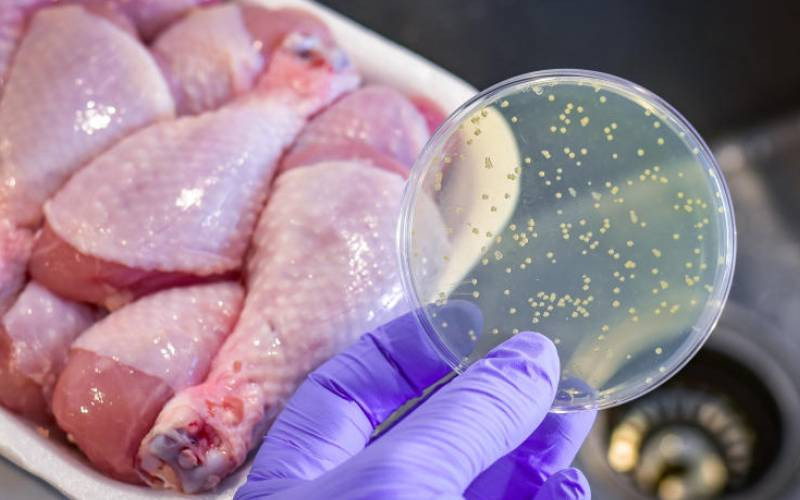
Millions of Kenyans who love fast foods are at risk of developing weakened immune systems and other serious diseases as a result of companies that raise broiler chickens in inhumane conditions and overuse drugs.
A report by World Animal Protection Africa on the welfare of broiler chickens reveals that companies thirsty for quick returns are overusing antibiotics and other drugs to treat and force broilers to grow faster in crowded places.
"Companies' inaction is not only an animal welfare issue; it also jeopardises human health due to antibiotic overuse in farming, fueling a deadly superbug crisis," Tennyson Williams, Country Director of World Animal Protection Africa, said in a report conducted across all international and local brands in the country.
William made the remarks when releasing the World Animal Protection global report, which examines animal welfare across the world.
"The annual report embraced a localized approach, evaluating how international and national fast-food brands and food service companies are making broiler chicken welfare commitments within individual markets and reporting on their progress in implementing those commitments," Williams said in the report.
The United States National Library of Medicine says that the overuse of antibiotics has led to an antimicrobial resistance challenge worldwide, which has caused severe infections, complications, longer hospital stays, and increased mortality.
The annual report shows global brands have neglected the welfare of animals in Kenyan farms as compared to how strictly they protected their animals abroad.
"For the global fast-food brands, despite their franchises in other geographical regions having animal welfare policies and having made commitments to improve broiler chicken welfare, the same did not apply to their franchises in Kenya," said William.
- Keep your home warm with these tips
- What to do if you feel dizzy after a meal
- Easy recipe: Pide 'Fatayer' Turkish flatbread
- Beauty of rare crunchy asparagus
Keep Reading
He added that this highlights the double standards of the brands globally.
"Raising welfare standards will reduce the need for routine antibiotics used to prevent disease among animals kept in appalling conditions, thereby helping to lower the risk of antibiotic resistance in humans," the report said.
The report said that big brands continued to ignore urgent consumer demands and animal welfare science, subjecting billions of chickens to unimaginable suffering.
"The animal resource industry, in collaboration with the government (the Directorate of Vet Services, the Directorate of Livestock Production, and the Kenya Bureau of Standards, among others), should review the food animals' welfare to align it with the globally recognized farms," William said.
According to the report, billions of chickens are subjected to unnecessary suffering each year as a result of fast-food companies' refusal to take the welfare of the chickens in their meat supply chain seriously.
"These inquisitive and social animals often live their entire lives in chronic pain, suffering from lameness, skin lesions, and even heart failure caused by selective breeding, which leads to an unnaturally fast growth rate," the report said.
They are unable to engage in their natural behaviours, such as foraging, dust bathing, and perching, because they are crammed on factory farm floors with little to no environmental enrichment.
Since then, while there has been some progress made on improving chicken welfare and some companies are innovating by offering meat-free options on their menus, most companies have received embarrassingly low scores in "The Pecking Order 2022."
He said that most companies failed to make the welfare of the animals in their farms public despite committing to global bodies.
"Even where companies have committed, they are either not reporting on it or implementing it in their supply chain is slow," he said.
This year's report reminded consumers that some of the world's leading food companies are deliberately ignoring large-scale animal cruelty in their supply chains and, as a result, are eroding their social license to operate.
"Shockingly, big brands continue to ignore urgent consumer demands and animal welfare science, subjecting billions of chickens to unimaginable suffering," he said.
"Raising animal welfare standards will reduce the need for routine antibiotics used to prevent disease among animals kept in appalling conditions, thereby helping to lower the risk of antibiotic resistance in humans. These companies are failing people, animals, and the planet."
The report said that these companies know that consumers are not interested in paying for animal suffering and are increasingly holding companies accountable for how animals used in their supply chains are treated. "There is no justification for profiting from the pain of billions of sentient animals," he said.
He said the report shed light on the chicken meat industry over the last four years and highlighted the welfare standards of the most influential global fast-food brands.
"While we welcome the progress of some, others must be held accountable for their shameful lack of consideration for animal welfare," he said.
The report added that both local and foreign companies operating in Kenya have yet to start reporting on their commitments, were performing poorly, and lacked any animal welfare policies or commitments.
According to the report, Germany is the best-performing country, with an average overall percentage score of 37 per cent, broken down into 60 per cent for commitments and targets and 13 per cent for performance reporting.
France had the second-highest average overall percentage score at 36 per cent, followed by Spain at 23 per cent, Italy at 19 per cent, and the United States at 19 per cent.
Australia and Canada scored 13 per cent, while Croatia scored two per cent, followed by Kenya and Thailand at three per cent.
 The Standard Group Plc is a multi-media organization with investments in media platforms spanning newspaper print
operations, television, radio broadcasting, digital and online services. The Standard Group is recognized as a
leading multi-media house in Kenya with a key influence in matters of national and international interest.
The Standard Group Plc is a multi-media organization with investments in media platforms spanning newspaper print
operations, television, radio broadcasting, digital and online services. The Standard Group is recognized as a
leading multi-media house in Kenya with a key influence in matters of national and international interest.

